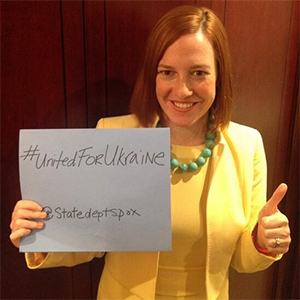In Need of a Doctrine: On America's Response to ISIS and the Invasion of Ukraine
 | | How do you respond to this? |
It's the day after ISIS released its second video threatening the US while showing the graphic decapitation of an American journalist, and the State Department has announced (via Twitter) that we will send 350 troops to Iraq to help defend our diplomats. Of course, the administration wants to assure us that these troops "will not serve a combat role," which makes one wonder exactly what they will be doing there. Perhaps the president has sent them over to draw red lines in the sand.
I'm not without sympathy for the administration's political predicament. President Obama took office on a wave of growing exhaustion with war, an exhaustion I can admit to sharing. He then made good on his promise of getting troops out of Iraq by putting less than zero effort into negotiating a "status of forces" agreement with the Iraqi government, and assumed he could get on with the important business of demanding minimum wage increases and telling Congress that they must do what he wants or else he will go around them and do it anyway. Still, the politics of the matter shouldn't be as important as the reality of the problem, and the reality is that we seem to have put ourselves back into a September 10th mentality of treating terrorist threats and beheadings as a law enforcement issue instead of a sovereign one.
While the State Department refuses to say we are at war with ISIS, people with student visas are vanishing within our national borders, just as the 9/11 hijackers did, ISIS is posting pictures of major American cities on their social media sites with completely unveiled threats about considering each one a potential target, Syria is providing a safe haven for terrorists in direct defiance of the Bush doctrine (which states that we will draw no distinction between terrorists and those who harbor them), and the president is openly admitting to the world that we don't have a strategy concerning ISIS in Syria. Non-interference is a noble goal and an understandable reaction to over a decade of war that has seen few easily-verifiable results, but there comes a point where non-interference becomes sheer stupidity.
 | | This happened immediately after the president first talked about the Foley beheading |
Now sure, we've lobbed a few bombs into Iraq to hurt ISIS, but that hardly seems effective. I'm not suggesting we should march in and invade again, but we should certainly be doing more than we seem to be. The president could at least pretend to be working on the problem instead of going straight to golf and fist-bumps after a box-checking acknowledgment that an American was just beheaded in front of the world. He could at least project a little bit more force or do a little bit of consistent diplomacy with our allies instead of reiterating that the 350 measly troops he's sending to Iraq aren't intended for combat.
The painfully obvious problem is that the United States now has no credibility when it comes to its threats. The Assad regime strutted across the president's red line, and nothing happened. Russia invaded Ukraine, which has created the biggest international crisis in Eurasia in decades, and nothing happened. You really think Putin gives a crap about a few meaningless trade sanctions or U.N. condemnations? You think he's really going to be swayed by the State Department hashtagging "UnitedForUkraine"? Just a few days ago, he said he could be in the Ukrainian capital in two weeks if he wanted (though the Russians are telling us this wasn't supposed to be a public comment, as though that somehow makes it less terrifying). When President Obama threatens, tyrants and terrorists laugh, but nobody seems to be laughing at Putin or ISIS.
Say what you will about the last administration's use of force, but at least the last administration actually used force. This administration has been absolutely up-front about its unwillingness to even consider projecting military force. Concerning Ukraine, we are on record as conceding that force is totally off the table. Yes, we should exhaust our diplomatic and peaceful options first--and exhaust them well--but we should never take the military off the table. The Cold War didn't end peacefully because we promised to mothball our nuclear warheads. Quite the opposite, really. We made sure the Soviets understood that we had our finger on the button and we might just be crazy enough to push it if we felt threatened. Mutually assured destruction is a powerful deterrent, but it only works if you show your willingness to use the weapons at your disposal.
 | | Putin's reaction to the latest threat of sanctions |
I don't think we should lay all the blame for ISIS and the Ukraine invasion at President Obama's feet. While his weak-kneed and inconsistent foreign policy certainly hasn't helped, we did elect the man, and we are tired of being the world's police force. You can certainly make the case that President Bush's poor handling of post-war Iraq and Afghanistan did serious damage to our national reputation and ability to use righteous force in the future. But really, the blame for ISIS begins and ends with ISIS, and the person to blame for Ukraine is Vladimir Putin. The problem is that presidents past and present have rendered us impotent to do anything about either.
Where Ukraine is concerned, perhaps we can take solace in the argument that it's not our problem. While this has historically proven to be a laughably poor decision, we do need to remember that, without a clear threat to our nation and her interests, we risk being the kind of imperial power we have spent the whole of our country's history fighting against. It would be fantastic if we could sit back and let other nations take care of the world's problems, but we have trained them over the last century to rely on us, even while they decry our cowboy diplomacy and arrogant use of force. If we suddenly leave them to the wolves, the result will be utter chaos and another world war, one we might not survive.
 | | This wouldn't be so embarrassing, except that's Jen Psaki, the spokesperson for the goddamn State Department |
Where ISIS is concerned, though, we simply can't take the ostrich approach. We, as a nation, have been threatened, clearly and directly. Our people have been brutally murdered in front of our eyes, their bodies displayed for everyone to see. If we don't do anything serious to respond to that, what kind of message does that send to every extremist out there who thinks they can bully us around? If our best response to that kind of violence is to leak a report about how we tried to save some hostages a year ago and failed, does that really keep our nation safe from future violence?
There's got to be a middle ground then between the two extremes, between excessive force and no force at all, between Bush and Obama. We need a leader who can build coalitions instead of dividing them, who can unite Congress into action instead of choosing to ignore it when it refuses to genuflect to his or her will. We need to be diplomatic but firm, to speak softly and carry a big stick. No, we shouldn't make enemies of other nations, but we also shouldn't let mercurial opinion dictate how we behave. We need a reliable, consistently-applied, and easy-to-understand policy that keeps us from getting involved in every violent confrontation in the world while ensuring that the worst people out there know how foolish it would be to piss us off.
Unfortunately, I don't see that happening any time soon.
-e. magill 9/3/2014
|
|